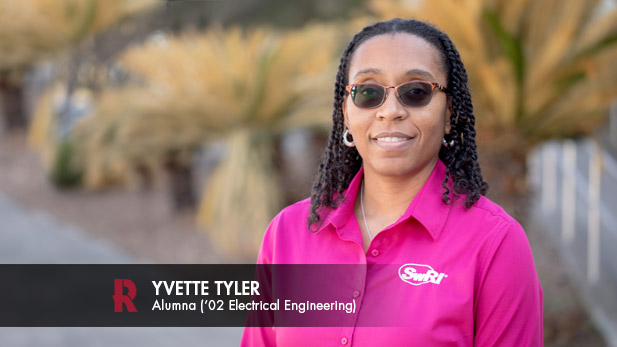Rose Alumnus Yvette Tyler Engineers Devices Sent to the Final Frontier

The Europa Clipper is just one project that Yvette Tyler, a 2002 electrical engineering graduate, has contributed to as a staff engineer with the Space Systems Division of Southwest Research Institute (SwRI).
Can life be sustained on the planet Jupiter? That’s what NASA is investigating with its Europa Clipper. The device, which is set to launch in October 2024, will explore Jupiter’s icy moon, Europa, and consider whether it could harbor conditions suitable for life. The Europa Clipper is just one project that Yvette Tyler, a 2002 electrical engineering graduate, has contributed to as a staff engineer with the Space Systems Division of Southwest Research Institute (SwRI).
Upon graduating from Rose-Hulman, Tyler immediately joined SwRI and has been working for the company in various roles for 21 years. She began her career as a test engineer and later progressed to be the lead engineer for avionics boxes. She has worked on several projects performing system engineering work related to design architecture, integration, verification, validation and analysis.
Over the last several years, Tyler led all facets for the design and development, as well as integration and testing, of the electronics box on the Europa Clipper mission known as the MAss SPectrometer for Planetary EXploration (MASPEX) instrument. The mass spectrometer will analyze gases in Europa’s faint atmosphere and possible plumes. It will also study the chemistry of the moon’s suspected subsurface ocean, how ocean and surface exchange material, and how radiation alters compounds on the moon’s surface.
“I was responsible for making sure all the electronic boards within the box communicated and operated with each other and supported the instrument,” said Tyler. “I was also responsible for overseeing all the testing activities and final integration and test of the box before delivery to Jet Propulsion Laboratory.”
Now that the MASPEX device is currently going through spacecraft level integration and testing, Tyler has shifted her focus on working on a miniature fast neutron detector for the moon lander project. This is the third generation of a series of Radiation Assessment Detectors (RAD) on which Tyler has worked. The first one was for the Curiosity Rover, the largest and most capable rover sent to Mars as part of NASA’s Mars Science Laboratory mission. The second generation of that unit was on the International Space Station. Tyler’s current project is a portion of what was sent to the space station and will be included in the moon lander.
Tyler knew she wanted to be an engineer since career day of her junior year of high school. When it came time to look at colleges, the Indianapolis native focused on engineering schools and narrowed her choices to Rose-Hulman and Purdue. After visiting Rose and learning that all students received a laptop for school — at a time when laptops were somewhat new in the college scene — Tyler knew Rose was an institution where every student would be on an equal playing field toward success.
Tyler, a first-generation college student, was one of the first participants in Rose’s cooperative education program in which she worked during her time in school. During her time on campus, she was part of the National Society for Black Engineers, Intervarsity Christian Fellowship, and played intramural sports. She believes her years at Rose have had a direct impact to her successful engineering career with Southwest Research Institute.
“The professors at Rose really taught us how to problem solve, and the lecture and lab experience was invaluable,” said Tyler. “When I got to SwRI, my supervisors and leaders were pleased with all my lab experience at Rose. Those years really taught me how to learn, which has helped the on-the-job training at SwRI.”